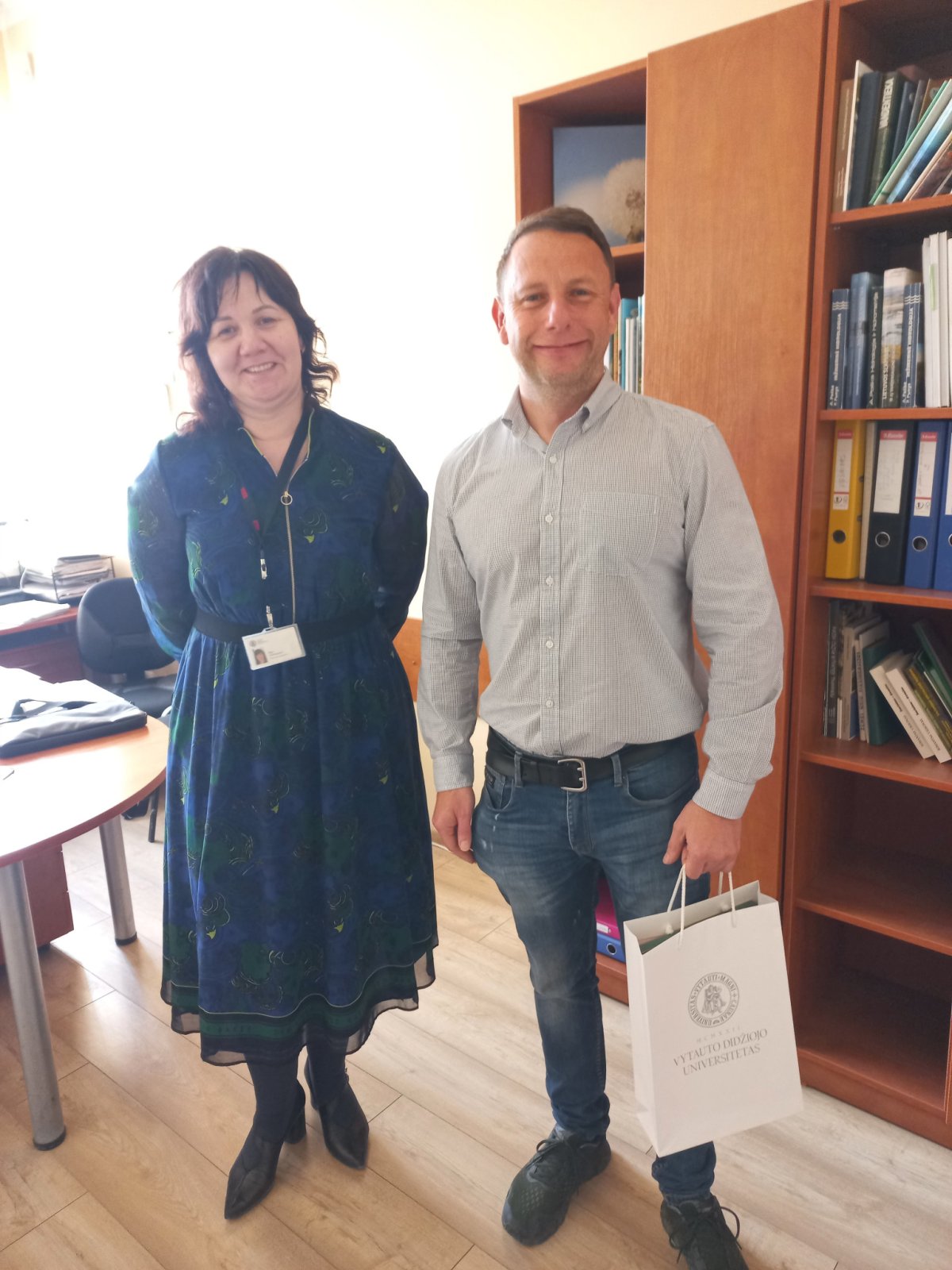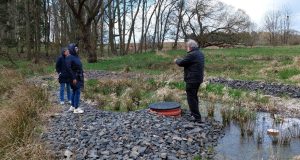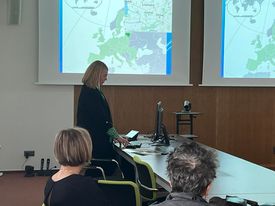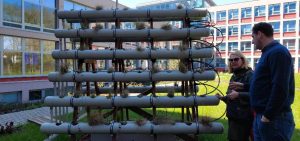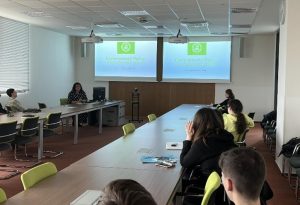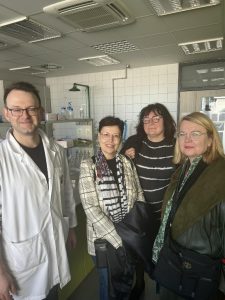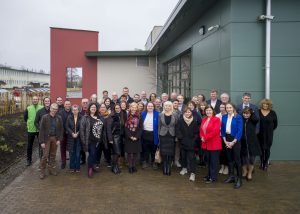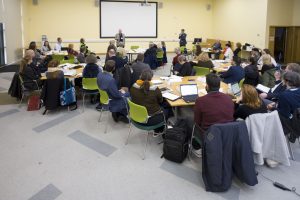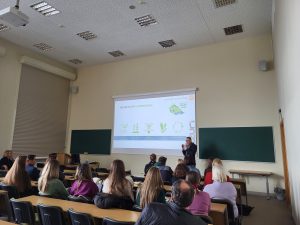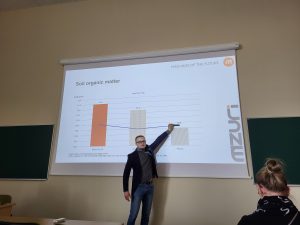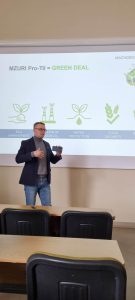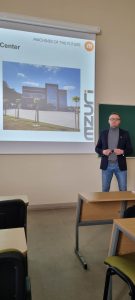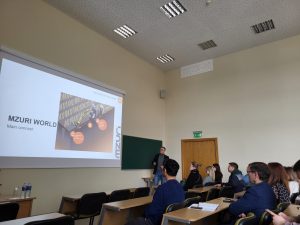The Erasmus+ project “Medical beekeeping – for beekeepers”
Bees provide a crucial ecological service by pollinating plants, which is essential for plant life. Beekeepers use these insects to harvest honey, pollen, bee pitch, royal jelly, wax, bee venom, and other useful and helpful elements for health. These products, however, must be produced in a secure and proper way.
The Erasmus+ project “Medical beekeeping – for beekeepers” (MEDI-BEEB) addresses these issues. Adnan Menderes University (Turkey) is the project coordinator, project partners include the Confederation of Italian Farmers of Umbria, Onsekiz Mart University of Cenakale, Wroclaw University of Environment and Life Sciences, Aydin Province Beekeepers’ Association, and Vytautas Magnus University (VMU). The third meeting of the project “Medical beekeeping for beekeepers” took place on May 16-17 at the Wroclaw University of Environment and Life Sciences (Poland). Prof. dr. Virginija Dulskienė and assoc. prof. dr. Anželika Dautartė of the Department of Environment and Ecology at the Faculty of Forest Sciences and Ecology at VMU Agriculture Academy participated in the meeting. The training materials being prepared in a virtual environment, where video topics of best practice examples are discussed to diversify, develop and increase the value of the production produced by beekeepers and its application for apitherapy purposes. Soon this information will also be available on the project website and mobile app. The final meeting of the project will be held on November 8-9 at Vytautas Magnus University.
More information about the project can be found at the project website: https://www.medibeeb.eu/
SKF company representative visited VMU Agriculture Academy
SKF (Luton, UK) company Operation manager and Visual management expert Colin Chapman 24-28 April 2023 visited Faculty of Engineering at Vytautas Magnus University Agriculture Academy (VMU AA). SKF is worldwide know company (distributors can also be find in Lithuania). SKF opened its first UK sales office in London during 1910 and the following year bearing production commenced in Luton, at its first manufacturing facility outside of Sweden. Today, SKF Limited has 13 locations throughout the UK, including ten manufacturing facilities (four rolling bearings and six machined seals), with approximately 1,250 employees. One of SKF office is located in Lithuania as well.
SKF was listed as one of the world’s most sustainable companies by both the Dow Jones Sustainability World Index (DJSI) and the Dow Jones Sustainability Index for Europe. SKF has achieved a Platinum Medal from EcoVadis, one of the world’s most trusted providers of sustainable ratings for use in supply chains on 15th December 2022 (Gothenburg). This is the third year SKF has been awarded the Platinum medal and now ranks in the top 1 percent of all companies assessed by EcoVadis. In addition, SKF has received an A- Climate Change rating from the CDP, the global non-profit that runs the world’s largest climate and environmental disclosure system for companies, cities, states and regions.
University students have got acquainted with the principles of development of engineering management and types of engineering management in a world-class company. Students were introduced to CDP Climate Change and 5S visual management score that provides a snapshot of a company’s disclosure and environmental performance. The scoring methodology provides a comparable dataset across the market. Visual management technique enables production operatives to identify “abnormal vs normal” in the workplace using the “at a glance concept”. This in the fast pace of manufacturing saves time and reduces waste which in turn make the facility more profitable (delivering a quality product to the customer on time and in good quality. The sort stage of 5s sorts necessary from unnecessary (basically sorting through items of little to no value to items of value and need) clears the work place of clutter and only relevant and needed items remain.
5s is now part of the culture at SKF Luton which was first developed by the car manufacturer Toyota.
To earn leadership recognition, companies must show environmental leadership, disclosing action on climate change. Setting new standards and creating partnerships to contribute to the development of clean technology solutions, improvements in energy efficiency, and the needed reduction of CO2 emissions across industries. SKF solutions play a key role in reducing CO2 emissions across a range of industrial applications. SKF also committed to decarbonizing them entire production by 2030 and having net-zero greenhouse gas emissions in our full value chain by 2050.
The third meeting of the project “Medicinal beekeeping – for beekeepers” [MEDI-BEEB] in Wroclaw
Bees provide a crucial ecological service by pollinating plants, which is essential for plant life. Beekeepers use these insects to harvest honey, pollen, bee pitch, royal jelly, wax, bee venom, and other useful and helpful elements for health. These products, however, must be produced in a secure and proper way.
The Erasmus+ project “Medical beekeeping – for beekeepers” (MEDI-BEEB) addresses these issues. Adnan Menderes University (Turkey) is the project coordinator; project partners include the Confederation of Italian Farmers of Umbria, Onsekiz Mart University of Cenakale, Wroclaw University of Environment and Life Sciences, Aydin Province Beekeepers’ Association, and Vytautas Magnus University. The third meeting of the project “Medical beekeeping for beekeepers” took place on May 16-17 at the Wroclaw University of Environment and Life Sciences (Poland). Prof. dr. Virginija Dulskienė and assoc. prof. dr. Anželika Dautartė of the Department of Environment and Ecology participated in the meeting. The training materials being prepared in a virtual environment, video topics of best practice examples are discussed here, to diversify, develop and increase the value of the production produced by beekeepers and its application for apitherapy purposes. Soon this information will also be available on the project website and mobile app. The final meeting of the project will be held on November 8-9 at our university.
More information about the project can be found at https://www.medibeeb.eu/
Interactive Webinar “Why worth you choose MBA programme “Customs Process Management” for your career?”
VISIT OF TEACHERS OF VMU AGRICULTURE ACADEMY TO CZECH UNIVERSITY OF LIFE SCIENCES PRAGUE
The teachers of Vytautas Magnus University Agriculture Academy assoc. prof. dr. Midona Dapkienė (Department of Water Engineering, Faculty of Engineering), prof. dr. Laima Česonienė and assoc. prof. dr. Daiva Šileikienė (Department of Environment and Ecology, Faculty of Forest Sciences and Ecology) visited Czech University of Life Sciences Prague (CZU) according to Erasmus+ Mobility agreement on April 17th to 20th 2023.
The Czech University of Life Sciences is a public university. Currently the University has more than 18 000 students (10% are international students), 6 Faculties and 1 Institute. CZU offers over 170 accredited study programmes at BSc, MSc and PhD levels (in 9 BSc, 20 MSc and 18 PhD programmes the language of instruction is English). The University has 1 700 employees, of which more than 700 are professors or associate professors.
The one of faculties of CZU – the Faculty of Tropical AgriSciences is a unique institution in central Europe. The mission of this Faculty is the higher education of foreign and Czech students in the fields of tropical agriculture, rural development and the sustainable management of natural and energy resources in the tropics. This experience would be useful in VMU Agriculture Academy, as a large number of students from various African and Asian countries are attracted to study in this Faculty.
The representatives of VMU Agriculture Academy gave the lectures for bachelor, master and Erasmus students of the Faculty of Environmental Sciences in the field of wastewater treatment and reuse, influence of climate change on surface water status, environmental policy and Green Deal.
The Faculty of Environmental Sciences is divided into six departments (Department of Water Resources and Environmental Modeling, Department of Applied Ecology, Department of Ecology and other) which cover the whole field of education and science at the Faculty.
The teachers had an opportunity to familiarize with the study process and reasearch at CZU, to visit the laboratories of Faculty as well as to discuss the possibilities of the joint project.
The representatives of Agriculture Academy also had an opportunity to visit Amálie Smart Landscape, located in a rural area near Prague. The Amálie site is one of the pilot projects of the CZU, in which experts are implementing specific measures to increase the adaptation of the landscape to climate change. On an area of approximately 500 hectares of agricultural land owned by the CZU, measures are being implemented, in particular to retain surface water, restore natural wetlands, secure erosion-prone slopes and monitor the hydrological regime. The Head of Department of Applied Ecology prof. Jan Vymazal showed all the components of the pilot, introduced to the goals of the ongoing project and the benefits of Smart Landscape.
Invitation to the lecture
We kindly invite students to participate at the lecture by Michał Stocki on topic “Skills of the Future. Finance on autopilot: The current situation and the future of automating reporting processes”. Michał Stocki is an Analytics Solutions Senior Associate in Forecast Automation team at JP Morgan Chase, Warsaw, Poland. JP Morgan Chase is a global and diverse financial services banking company.
The lecture will be held on 24 April at 11.15, 420 room, Faculty of Bioeconomy Development of VMU AA.
SafeHabitus, EU Farm Safety project kicks off in Ireland
An international team of 45 farm safety experts, researchers, farmer and farm worker representative organisations met in Dublin on January 25th and 26th to begin implementing an ambitious initiative to improve farmer and worker health and safety across the EU. The SafeHabitus project has received 4.8 million euros in funding through the EU Horizon Europe programme and will run for four years.
Speaking at the meeting the project leader, David Meredith stated that SafeHabitus is focused on reducing injuries and fatalities amongst farmers and farm workers and strengthening the social sustainability of EU food systems. Farming is one of the most dangerous jobs in Europe. European statistics show that the farming fatality rate is 233% higher than other industries and the accident rate is 18% higher. Dr Meredith stressed that these figures underestimate the scale of the problem as a significant proportion of farm workplace fatalities, injuries and ill health go unreported, un-investigated, and prevention approaches are not learned. Improving farmers’ and farm workers’ health and safety requires action by a range of stakeholders to empower and support them to change unsafe practices and adopt new, safer and healthier ways of working.
SafeHabitus is led by Teagasc, the Irish Agriculture and Food Development Organisation, and involves 20 partners from 13 countries across Europe including Romania, Slovakia, Slovenia, Poland, Lithuania, Estonia, Finland, Germany, Belgium, France, Spain, Ireland and the UK. Researchers assoc. prof. dr. Laura Girdžiūtė, assoc. prof. dr. Anastasija Novikova and assoc. prof. dr. Gediminas Vasiliauskas from Vytautas Magnus university are involved in SafeHabitus activities.
The project involves a network of researchers, farm advisory services and educators, who will work with farmers and policy makers at national and EU levels of design, develop and test practical initiatives that support improvements in the safety, health and wellbeing of farmers and farm workers, and overall contribute to the EU transition to social sustainability in farming.
Lecture by Łukasz Lewandowski: Towards CO2 reduction, healthier soil, lower fuel and working time costs
On the 30th of March, Łukasz Lewandowski, a business partner who came under the Erasmus+ program, visited the Faculty of Agronomy and gave a lecture to the gathered students and lectures about the application of Strip-Till technology, the preservation of moisture in the soil, the reduction of gas emissions, the modernization of the farm and the economy of its management. The speaker shared his practical experience in business and his own farm, theoretical knowledge, colleagues’ from Poland and the first results of his own scientific research.
During the meeting, there was a discussion about the negative impact of intensive farming and heavy use of chemical agents on agricultural and natural ecosystems. As one of the possible solutions, the lecturer proposed the Strip-Till seeding technology for strip tillage, soil fertilization and sowing at the same time. By sowing directly into the stubble field, high soil fertility is maintained, about 30% less fertilizer is used before sowing, fuel consumption is reduced by 3 times, time and human resources are saved. The seeds are placed in moist, well-aerated, well-structured soil. Favorable air and moisture conditions lead to intensive plant rooting, development and, of course, abundant, good quality harvest. Applying technologies with a sustainable impact on the environment, abandoning intensive soil plowing and cultivating, together with reducing fuel consumption, can significantly limit CO2 and N2O emissions.
The end of the lecture was crowned by a discussion between the gathered students, lectures and the speaker. Łukasz Lewandowski was willing to share his thoughts on reducing pesticides on the way to sustainable and healthier farming.
Public lecture “The experience of world communities in the implementation of solutions for sustainable rural development”
We kindly invite to participate at the public lecture by assoc. prof. dr. Pavel Kotyza from Prague University on topic “The experience of world communities in the implementation of solutions for sustainable rural development”. The lecture will be held online on 5 April 17 p.m. (EEST).
Date: 5 April
Time: 17 p.m. (EEST)
Place: online
Vytautas magnus University Agriculture Academy (VMU AA) Faculty of Bioeconomy Development Department of Business and Rural Development Management professor dr. Vilma Atkočiūnienė
Invitation to A Free Webinar on The Field of Customs and Its Knowledge Management
In 2023, Vytautas Magnus University Agriculture Academy (VMU AA) Faculty of Bioeconomy Development execution begins the first MBA (Master of Business Management) study program in Lithuania in the field of customs Customs Process Management for individuals and managers working in business.
If you want to know more about the customs field and knowledge management in this field, we invite you to the Customs Knowledge Institute free webinar Day-to-day customs and trade compliance management. The webinar will take place on 2023 April 4.
In this webinar, the head of the development group of the MBA study program Customs Process Management, associate professor of the Faculty of Bioeconomy Development dr. Erika Besusparienė will make a presentation “Knowledge management: understanding generation Z (GenZ) in the workplace”.
Date: 2023 April 4
Time: 15:00-16:00 CEST
Place: online
- About
- About Agri-Food BM programme
- Academic infrastructure units
- All events
- All news
- Aquaculture center
- Archives
- Biosystems Engineering
- Center of Animal husbandry selections, breeding values and dissemination
- Centre of Biosystems Engineering, Biomass Energetics and Water Engineering
- Circular Biobased Economy
- Climate change
- Contacts
- Contacts
- Events
- Events archive
- Faculties
- For business and society
- Innovative products
- International Cooperation
- International projects
- Joint Research Centre of Agriculture and Forestry
- Journal “Human and Nature Safety”
- Laboratory of Technology Safety
- Laboratory services
- Living Environment
- More labs
- News
- Project
- QUALS project description
- Research
- Research areas
- Scientific events
- Scope
- Sitemap
- Studies
- Study programmes
- Technology Transfer & Commercialization
- THE ROLE OF ORGANISATION IN THE PROJECT
- THE ROLE OF ORGANISATION IN THE PROJECT
- THE ROLE OF ORGANISATION IN THE PROJECT
- The Study Process
- Žemės ūkio žinių ir inovacijų sistemos klasteris





